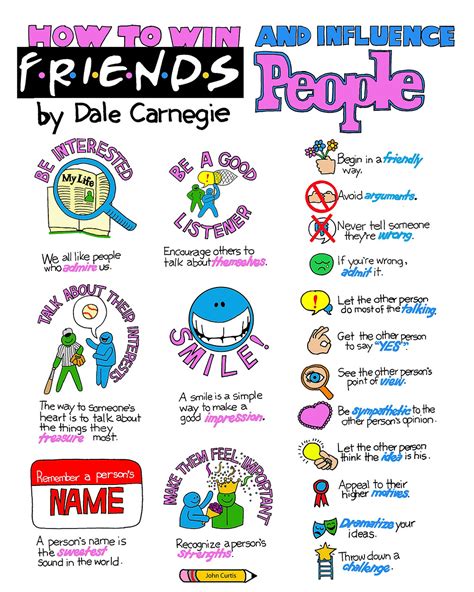How to Win Friends and Influence People: A Summary and Actionable Guide
Dale Carnegie's timeless classic, "How to Win Friends and Influence People," offers a wealth of practical advice on improving interpersonal relationships and achieving success through effective communication. This summary highlights key principles, providing actionable steps you can implement immediately.
Fundamental Principles: Become genuinely interested in other people.
The core of Carnegie's philosophy hinges on sincere interest in others. This isn't about superficial flattery; it's about genuinely caring about people's lives, experiences, and perspectives.
- Actionable Step: Practice active listening. Focus on understanding the other person's point of view rather than formulating your response. Ask open-ended questions and show genuine curiosity.
Remember that a person's name is to that person the sweetest and most important sound in any language.
Remembering names demonstrates respect and creates a positive first impression. It shows you value the individual.
- Actionable Step: Make a conscious effort to remember names. Repeat the name when you're introduced, and try to associate it with a visual or memorable detail.
Six Ways to Make People Like You
This section details practical techniques for building rapport and fostering positive relationships.
1. Become genuinely interested in other people. (Repeated for emphasis)
This point is so crucial, it bears repeating. People appreciate genuine interest and connection.
2. Smile.
A simple smile can drastically improve interactions. It conveys warmth, approachability, and positivity.
- Actionable Step: Practice smiling more often, both in personal and professional settings. A genuine smile is infectious.
3. Remember that a person's name is to that person the sweetest and most important sound in any language. (Repeated for emphasis)
Again, this underscores the importance of personalization and respect.
4. Be a good listener. Encourage others to talk about themselves.
Active listening shows empathy and understanding. People enjoy sharing their experiences and feeling heard.
- Actionable Step: Ask follow-up questions to show you're engaged and genuinely listening.
5. Talk in terms of the other person's interests.
Focusing on the other person's interests makes them feel valued and understood. It's about connecting on a personal level.
- Actionable Step: Before any interaction, try to learn something about the other person's hobbies, work, or interests.
6. Make the other person feel important – and do it sincerely.
Genuine appreciation and recognition go a long way. People crave feeling valued.
- Actionable Step: Offer sincere compliments and acknowledge their achievements. Avoid empty flattery.
Winning People to Your Way of Thinking
This section explores strategies for influencing others without resorting to coercion or manipulation.
Avoid arguments.
Arguments rarely lead to positive outcomes. Instead, focus on finding common ground and understanding different perspectives.
- Actionable Step: If a disagreement arises, try to understand the other person's viewpoint before stating your own.
Begin in a friendly way.
A friendly approach fosters cooperation and reduces defensiveness.
Get the other person saying "yes, yes" immediately.
Positive reinforcement through agreement builds momentum for further influence.
Let the other person do a great deal of the talking.
Allowing the other person to express themselves creates a sense of being heard and valued.
Let the other person feel that the idea is his or hers.
Giving credit and ownership fosters a sense of accomplishment and buy-in.
Try honestly to see things from the other person's point of view.
Empathy allows for a better understanding and more effective communication.
Be sympathetic with the other person's ideas and desires.
Appeal to the nobler motives.
Frame your requests in terms of shared values and goals.
Dramatize your ideas.
Making your points memorable increases their impact.
Be a Leader: How to Change People Without Giving Offense or Arousing Resentment
This final section focuses on leadership and influencing others effectively. It emphasizes avoiding criticism, condemnation, and complaint. Instead, it promotes understanding, appreciation, and positive reinforcement.
Key Takeaway: "How to Win Friends and Influence People" is a practical guide filled with timeless wisdom. By applying these principles, you can cultivate stronger relationships, improve communication, and achieve greater success in all areas of your life. Remember, genuine interest, empathy, and respect are the cornerstones of effective interpersonal relationships.
